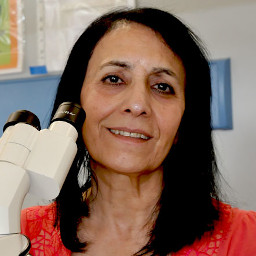Professor Munira Kadhim
Professor in Radiation Biology
School of Biological and Medical Sciences

Role
Munira's research background is in the effects of damaging agents such as chemicals and radiation on cells and tissues. She gained her first degree in Biology from Baghdad University and her PhD in Genetics from Swansea University.
Before coming to Oxford Brookes University, she worked as a post-doc at Swansea University; the Weatherall Institute of Molecular Medicine, University of Oxford then moved to the Medical Research Council, Harwell where she became a research group leader for Genomic Instability (GI). Currently her research at Brookes is focused on the damaging effects of radiation on mammalian cells.
Munira's research into the 'non-targeted effects' of radiation including GI and Bystander Effects (BE) has had extensive conceptual impact leading to reconsideration of the recommended dose limits permissible in both clinical and environmental contexts. Her research has been referenced by major international bodies such as UNSCEAR (United Nations) and has led to her advisory role to UK Government Departments through the Committee on Medical Aspects of Radiation (COMARE).
Her contribution to the 2013 report to the Department of Health (in pre-submission review) has already impacted health risk assessment and clinical radiotherapy through its recommendations for new lower thresholds of dose levels to protect patient health, for example by contributing to changes in the clinical practice guidelines on low-dose radiation usage, for example CT scans.
Teaching and supervision
Courses
Modules taught
Undergraduate modules:
- Advances in Biotechnology
- Evidence Based Medicine and Diagnostics
- Skills for Life Scientists
- Project
- Research Methods for Healthcare Sciences
Postgraduate modules:
- Topics in Biotechnology
Supervision
Munira supervised postgraduated students within the field of cell, radiation and cancer biology.
Research
Munira's research centres on understanding the mechanisms of early and delayed damaging responses of radiation in directly irradiated and neighbouring bystander cells/tissues and their descendents. These include primary murine and human haemopoietic stem cells, lymphocytes, fibroblasts and cancer cells. This research is focused on investigating factors which influence these damages such as radiation type, dose and genetic background as well as identifying the nature of communication molecules involved in these responses. These investigations are carried out using several cellular and molecular approaches such as chromosome analysis for chromosome damage, general and specific DNA damage and advanced techniques for cellular signalling.
Centres and institutes
Groups
Projects as Principal Investigator, or Lead Academic if project is led by another Institution
- Dissecting radIation effectS into the Cerebellum micrOenVironmEnt driving tumor pRomotion – DISCOVER (led by AGENZIA NAZIONALE PER LE NUOVE TECNOLOGIE, L'ENERGIA E LO SVILUPPO ECONOMICO SOSTENIBILE) (01/01/2024 - 31/12/2026), funded by: European Commission
